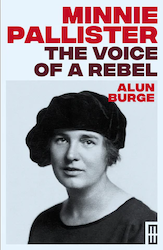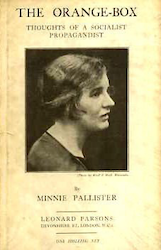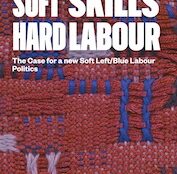Pioneering south Wales ILPer Minnie Pallister was one of the most important feminists, pacifists, socialists and journalists of the 20th century. But her life and legacy have been largely forgotten in recent decades. Author ALUN BURGE aims to put that right.
In a 1970 parliamentary debate Michael Foot evoked the memory of four socialist symbols of south Wales – the Chartists, the hunger marchers, Minnie Pallister and Aneurin Bevan.
 Foot claimed that when Pallister spoke from a soapbox in Tredegar, it was carried across the mountain to Merthyr, like some sort of religious icon, so it could be seen there. Bevan said that one of his first political acts was to carry a stool for Pallister to speak from, and he remembered the event throughout his life.
Foot claimed that when Pallister spoke from a soapbox in Tredegar, it was carried across the mountain to Merthyr, like some sort of religious icon, so it could be seen there. Bevan said that one of his first political acts was to carry a stool for Pallister to speak from, and he remembered the event throughout his life.
When Pallister died in March 1960, four months before Bevan, she was a household name. However, the importance of this feminist, pacifist, socialist, Brynmawr school teacher has been forgotten, until now.
Minnie Pallister strode on to the national stage at the 1915 ILP national conference when, given less than two minutes to prepare, her anti-war speech caused a sensation. Following that conference Keir Hardie described Pallister as a new star bursting on the horizon.
She had already become the first woman president of an ILP federation in Wales – Monmouthshire – at the age of 29. For a young, single, woman to hold such a position in the industrial south Wales valleys, where the labour movement was dominated by coal and steel workers, was exceptional.
The leading woman opponent of the First World War in Wales, at a time when such opposition was extremely unpopular, she became in 1916 Welsh secretary of the No Conscription Fellowship, looking after the welfare of 900 conscientious objectors and their dependents.
Twice accused of sedition, she was one of the most prominent voices in Wales supporting the February 1917 Russian revolution, and her platform presence and power of oratory made her a peer of Sylvia Pankhurst and Tom Mann. Her intellect, personality and above all, her voice – that voice – defined her and helped propel her to the high echelons of Labour politics.
Pallister’s pen portrait reads like a catalogue of unlikely achievements – whether confronting head-on the men of the south Wales valleys over their wives’ domestic drudgery, which she described as a form of slavery; or as one of the earliest advocates of family allowances in the decades from 1918; or as the first full-time woman labour organiser in Wales for the ILP that year, or as Labour Party agent for Aberavon from 1920, when she was key in getting Ramsay MacDonald elected to parliament, and thus prime minister.
Pallister was elected president of the Welsh ILP in 1921, stood as an ILP parliamentary candidate for Bournemouth in 1923 and 1924, when women candidates were extremely rare, and she made perhaps the first political broadcast on the BBC in 1924 when she spoke on ‘Changing Ideals’, months before the first formal party political broadcast.
Cruel illness
During these years she wrote countless articles for the ILP paper, Labour Leader, as well as pioneering ILP pamphlets and a book called The Orange Box: Thoughts of a Socialist Propagandist. As its most prominent ILP woman, Pallister was to Wales what Jennie Lee was to Scotland and Ellen Wilkinson was to England. Considered the best woman orator in the Labour movement, she was appointed ILP national propagandist in 1923, where she worked alongside her closest friend Kathryn Bruce Glasier.
 Pallister was elected to the ILP’s National Administrative Council in 1926 and to the Labour Party’s National Executive Committee later that year – the first women from Wales to do so. Having reached national prominence in the Labour movement, and with a parliamentary career beckoning, she was struck down by an illness which cruelly robbed her of speech. Forced to resign from her positions by ill health, she was replaced on the ILP NAC by Oswald Mosley and on the Labour Party NEC by Wilkinson.
Pallister was elected to the ILP’s National Administrative Council in 1926 and to the Labour Party’s National Executive Committee later that year – the first women from Wales to do so. Having reached national prominence in the Labour movement, and with a parliamentary career beckoning, she was struck down by an illness which cruelly robbed her of speech. Forced to resign from her positions by ill health, she was replaced on the ILP NAC by Oswald Mosley and on the Labour Party NEC by Wilkinson.
Physical incapacity did not blunt her edge, however. Dependent on writing for an income during her years of infirmity and near-destitution, often bedridden, lying flat on her back and without the strength in her fingers to type, Minnie wrote 40 to 50 articles a year in longhand for the New Leader. Her pieces on war and peace and the iniquities of capitalism, including poverty, slums and disease, were cries for social justice.
However, her most remarkable achievement was probably her physical and financial recovery. After suffering years of paralysing infirmity, which reduced her to the edge of penury, she became successful, first as a journalist with the Daily Herald, Britain’s largest newspaper, and the Daily Mirror, and then as a broadcaster with the BBC. She travelled to Nazi Germany in late 1938 and 1939 to rescue Jews, helping bring them to Britain right up until the outbreak of the Second World War.
When her health returned, her journalistic career blossomed and she wrote around 600 articles, five books, including an autobiographical account of her life, a clutch of pamphlets and over 150 radio scripts. One of those was a programme on ‘South Wales and the ILP’ broadcast on the Welsh Home Service in 1949.
Fearless & principled
Fearless and principled and always challenging, not least in advocating gender equality, Pallister was initially barred from a position with the BBC because of her socialist politics, and later banned by the Corporation for her pacifism during the Second World War, before later being taken off air because of her feminism. However, she became an outstanding broadcaster who brought a cutting edge to Woman’s Hour’s more housewifely fare of light entertainment and domestic assurance.
Rejecting the 1950s conservative consensus around the role of women, with its artificially constructed ideals to which women were expected to aspire, her withering condemnation of women’s magazines and beauty pageants found echoes more than a decade later among a new generation of feminists. An exceptional advocate of women’s rights from the 1920s to the 1950s, she was a forerunner of the Women’s Liberation Movement. Previously unrecognised, she is an outstanding feminist of the 20th century.
Her authenticity as a broadcaster made her highly popular with Woman’s Hour’s three million listeners, although her regular challenges to the orthodoxies of the day caused much discomfort within the BBC hierarchy. Even so, she was made a guest editor of Woman’s Hour, one of the last for five decades, and was such a compelling figure that her ‘Life Story’ was serialised on radio over five days during her lifetime.
Alongside all this, she was for decades one of Britain’s most prominent pacifist voices. For good measure, she provided the inspiration for Spike Milligan’s ‘Goon Show’ character Minnie Bannister.
A plaque being unveiled to Minnie Pallister in Brynmawr in September 2024 describes her as a ‘Fearless Rebel’. There is no more fitting description.
—-
Alun Burge worked in the Welsh government’s Department of Social Justice from 2002 and in local government. He was part of a group that published We, The People: The Case for Radical Federalism and Our Right: The People’s Convention in early 2021.
Minnie Pallister: Voice of a Rebel by Alun Burge is published in September 2024 by Parthian Books.
The biography will be launched on 18 September on the same day as the Minnie Pallister plaque is unveiled in Brynmawr.


